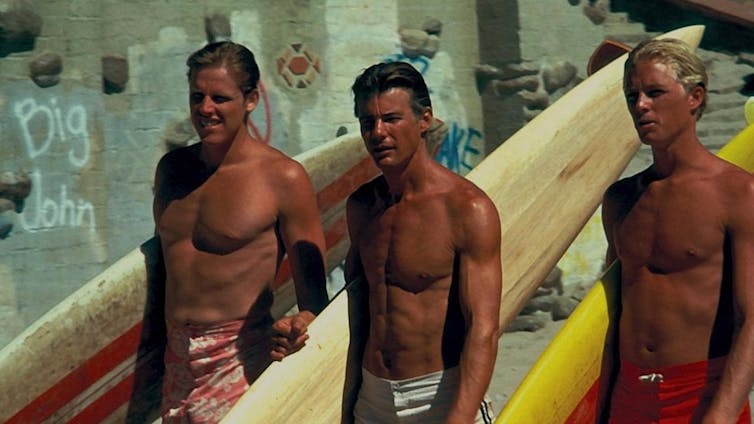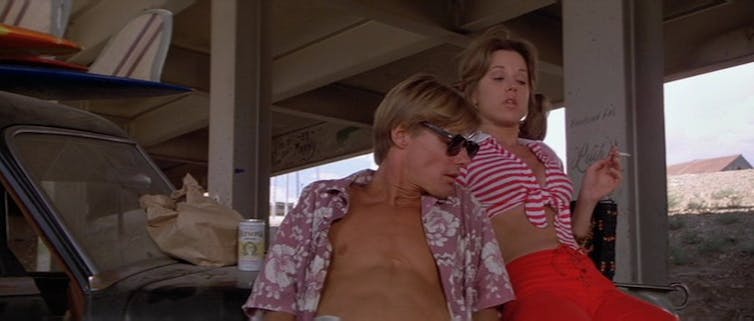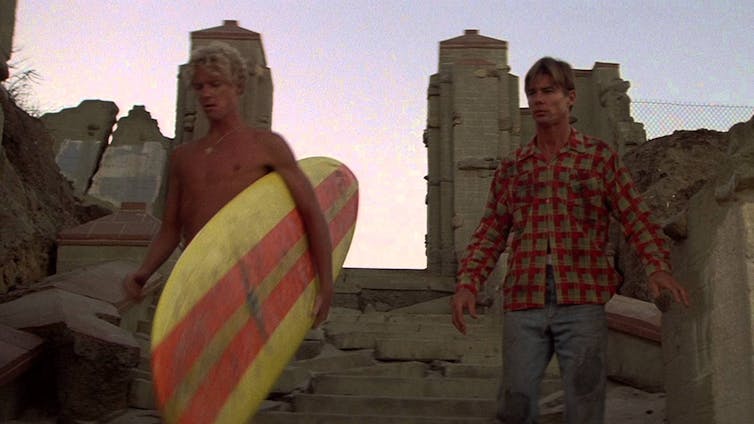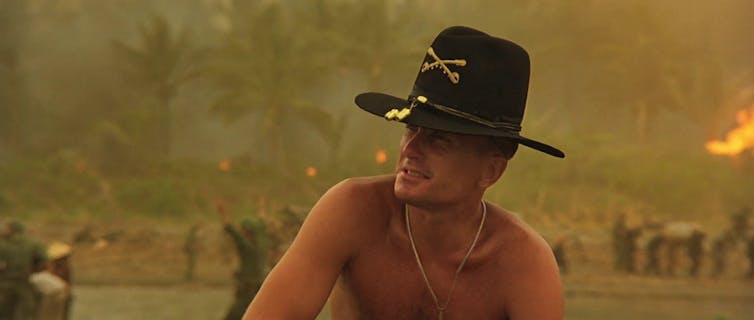Big Wednesday: four decades between surfing and myth making
Over the last 40 years, John Milius’ surf cult movie, Big Wednesday (1978), has made a mark on global popular culture. It inspired the names of things as disparate as the weekly New Zealand lotto draw, an Australian pale ale and countless storms and hurricanes.
In particular, Milius’ film had a huge impact on surfing subculture, both in shaping the international perception of the sport and providing one of the most authentic depictions of Californian surfers during the 1960s and 1970s. Big Wednesday went as far as moulding surfing iconography. The fictional "Bear surfboards” logo and T-shirts, originally created by the filmmaker as props for the film, went on to become a popular surf trademark owned by Milius himself.
Although today Big Wednesday is considered one of the best surf movies ever made, the path that led to its cult status was a long and convoluted one.
Big hopes
When the film was released in May 1978, everybody – the director, the producer and the prospective viewers – had big hopes for it. By the late 1970s surfing had become a fashionable, popular global sport. Milius, well-known for his involvement in successful productions such as Jeremiah Johnson, Dirty Harry and The Wind and the Lion, was considered to be one of the most promising filmmakers in Hollywood.
According to a famous Hollywood legend, Big Wednesday was part of a three-way profit point swap between Milius and his old friends, George Lucas and Steven Spielberg. However, while Star Wars (Lucas) and Close Encounters (Spielberg) would haul in hundreds of millions of dollars, Big Wednesday was a major critical and popular wipe-out, at least initially. It made only US$4.5 million (half of its original budget) at the box office.
The film is set in California between 1962 and 1974 and follows the lives of three surfers: Matt Johnson (Jan-Michael Vincent), a self-destructive local surf star, and his two best friends, Leroy “The Masochist” Smith (Gary Busey) and Jack Barlowe (William Katt).

From left, Gary Busey, Jan-Michael Vincent and William Katt in Big Wednesday
A coming of age story, it chronicles the three characters’ transition to adulthood with parties, surf trips, marriage and the Vietnam War in the background. In the last sequence of the film, the three are reunited to face the “Great swell of 74”, which represents the final moment in this maturation process.
From box office wipe-out to cult success
Some commentators ascribed the early critical and commercial failure of Big Wednesday to its excessive sentimentality. According to surf journalist Paul Gross, hardcore surfers found the film too cheesy. Other potential explanations suggested that in the late 1970s, the Vietnam wound was still too fresh and binge drinking, a prominent feature of the film, had lost its flavour.

Jan-Michael Vincent and Lee Purcell in Big Wednesday
Most importantly, upon its release, Big Wednesday’s premise that passion for surfing had an expiration date was unthinkable. However, the rapid commodification of surfing culture that occurred during the late 1970s and 1980s made Big Wednesday’s nostalgic celebration of a “pure” surfing culture relevant again.
Following its home video release in the 1980s, the film gradually acquired cult status. It become one of the most influential surf movies ever made. The cult success lay in its ability to combine the accurate observation of real people and events, the reproduction of believable stunts and performances, and a supercharged sense of the mythic. Much of the authenticity of the film was due to the fact that Milius was himself an avid surfer.
A surfer cum director
In a 1976 interview, when he was still at the beginning of his career, Milius claimed that “my religion is surfing”. In the late 1950s, Milius surfed regularly in Malibu, where he met Denny Aaberg, the brother of surf legend Kemp Aaberg and the future co-writer of Big Wednesday.
Originally Milius envisioned the story as a novel and he included the treatment in a letter, entitled “We were gods”, to literary agent Lynn Nesbit. Milius said that while the story was inspired by his own life experiences as a young surfer in Malibu, he was interested in achieving a balance between a realistic depiction of true events and the mythologising of surfers and surfing culture.
In Milius’ words:
We were outlaws, juvenile delinquents, anarchists and rascals. And at the same time our lives were regulated by a strict chivalry code. We were samurai.
In 1971, Milius discussed the idea of writing a book about their youth in Malibu with his friend Aaberg. In 1975, Warner Bros expressed a strong interest in Milius’ idea about a surf film, which in turn prompted him to buy the rights to the title of John Severson’s 1961 surf movie Big Wednesday.
Only on Wednesdays
Severson’s title referred to a surfing myth according to which all the great surf days of the year fall on Wednesdays. The seemingly paradoxical juxtaposition between an ordinary day (Wednesday) and epic adjective (Big) also matched Milius’ double ambition to provide both a realistic account of surfing subculture and to create a long-lasting surf mythology.
Milius and Aaberg based their script on their own stories about Malibu, which in the film would be referred to as “The Point”. All the main characters were inspired by real people, in particular surf legends Lance Carson and Kemp Aaberg and surfboard makers Hap Jacob and Dale Velzy. Similarly, most of the sequences of the film, including the iconic Vietnam draft dodging scene and the trip to Mexico, were based on the filmmakers’ own real-life experiences.
The film’s authenticity was enhanced by Milius’ connection to the surfing world, which enabled him to bring in experienced surf documentary maker Greg MacGillivray. MacGillivray, in turn, supervised a team of surf cinematographers. Several surf legends – Peter Townend, Ian Cairns, J Riddle and Bill Hamilton – were involved in the making of the film as stunt coordinators or doubles. Surf star Gerry Lopez, who would later appear as an actor in other films directed by Milius, played himself in the last sequence of the film.
The birth of a myth
The film’s success, as demonstrated by its great popularity in countries such as Italy where surfing is not a prevalent sport, was not limited to its depiction of surfing subculture. The film engaged with universal themes such as the passage to adulthood and the nostalgic celebration of an irrevocably lost golden age. While working on the script, Milius and Aaberg used Samurai stories, the Arthurian saga and Herman Melville’s Moby Dick as sources of inspiration.
Milius created a mythical aura around the protagonists of Big Wednesday. They were depicted as both titanic figures who embody physical perfection and barbarians who refuse to conform to the rules of civilised society. The opening and closing sequences of Big Wednesday feature the three protagonists walking through the ruins of a decaying portico like kings of an ancient civilisation where traditional values such as heroism, courage and loyalty are still upheld.

The heroes are depicted as walking like the kings of an ancient civilisation
The nostalgic celebration of friendship is strongly associated with the critique of contemporary capitalist American society. Similarly, the ocean and the American west coast symbolise the possibility of a return to the frontier, the physical and symbolical home of the “authentic” American character. In Milius’ film, the surfers are the last true American pioneers whose courage and heroism are forged by their ability to live at the intersection between nature and culture.
The idea of the ocean as the new Far West is reinforced by the film’s references to Milius’ favourite Westerns, including The Wild Bunch (the scene in which four characters walk to the draft office) and The Searchers (Hank Worden, the actor who played Mose Harper in Ford’s classic was cast as one of the secondary characters in Big Wednesday).
Milius, Big Wednesday and its legacy
Surf is a reoccurring trope in Milius’ work. He was also responsible for the creation of the surf-obsessed Captain Kilgore and some of the most iconic lines (“Charlie don’t surf”) in Apocalypse Now (1979). In the 1980s, Milius would go on to make commercially successful films such as Conan the Barbarian and Red Dawn. However, in the 1990s and 2000s his career declined rapidly.

Milius was later responsible for the creation of the surf-obsessed Captain Kilgore (Robert Duvall) in Francis Ford Coppola’s Apocalypse Now.
Although Milius, a self-proclaimed gun-loving Zen Anarchist, blamed Hollywood executives for blacklisting him on the grounds of his outspoken right-wing beliefs, his decline was caused, more likely, by a series of box-office flops and a stroke in 2010. To date Milius’ last major film-making credit is as creator of the acclaimed HBO TV show Rome in 2005. He features prominently in two documentaries about surfing: Hollywood Don’t Surf and Between the Lines: Surfers during the Vietnam War.
While Milius has been forgotten by most contemporary viewers and critics, the legacy of Big Wednesday continues to live on. Forty years after its release the passion and lyricism of the film are even more compelling. The mythical resonance of the Big Wednesday, the hump-day, when the week’s beginning tips into its end, when the gods of surf and youth reach the apex of their glory, continues to fascinate new generations of viewers.
//ALFIO LEOTTA
(This article was originally published on The Conversation)

Comments
I was on the North Shore when the deals were being done. Merkel for water shots, Bruce Raymond for wipe outs, Kanga and PT for the surfing. Came home one day and found PT on the lounge with a stranger, Jan Michel Vincent as it turned out. Not only didn't I recognise him, I didn't know who we was when we were introduced. I wasn't much of a movie fan in those days. It was an interesting time but my reaction when it came out was pretty much as described above. It was shallow sentimental and in many ways, seriously dated. Unlike many though, I never really changed my view. If it is one of the best movies ever made about surfing, that speaks more to the standard of the others than the merits of Big Wednesday.....but lots of people who needed it got a pay day and, from all reports, a considerable amount of fun was had in the process.
Classic. Didn't appreciate the movie at the time but every now and then
watch it over again. Enjoyed it a lot more than North Shore
Classic. Didn't appreciate the movie at the time but every now and then
watch it over again. Enjoyed it a lot more than North Shore
Classic. Didn't appreciate the movie at the time but every now and then
watch it over again. Enjoyed it a lot more than North Shore
Rick Kane wasn't available for this one..
"...reunited to face the “Great swell of 74”, which represents the final moment in this maturation process."
I mistakenly read that as "the final moment in this masturbation process", but then I realised that was a different film entirely. Big Wendy's Day, perhaps...
Or 'Shaving Ryan's Privates'?
Weekend at Gary’s?
Pffftt. What a load of drivel.
my girlfriend still hasn't twigged that i'm not really Jan-Michael Vincent...
I've enjoyed watching Big Wednesday and have probably seen it at least a dozen times. It seems to be one of those movies that rolls around every so often.
Tough crowd above, as cheesy as it may seem there's little bits here and there that as surfers, or moreso humans, we can relate to. Coming of age, relationships, responsibilty, human conflict and so on. Sure it's American, but the movie was never gonna be The Godfather.
A scene that sticks with me is when Waxer says 'If you send me to Vietnam, I'll just die' and the tight close up where you detect a hint of fear and maybe sadness in his face. Good acting? Who knows, but I thought the film maker did a good job of illustrating how fucked up conscription must have been for young men at the time.
Count me out. Not at all my take on surfing, nor a good movie.
Well it did have Patti d"Arbanville in it which is something I suppose.
Patti played the waitress and somebodies girlfriend. ZZZZZZ
Cat Stevens wrote a song toher."My Lady d"Arbanville"
Patti had previously been in a Warhol film. Flesh.
She also played the lead in BILITIS. A soft core French flic by David Hamilton that some people think bordered on paedophilia.
She went on to marry Don Jonson of Miami Vice fame. blah blah blah.
What has all this got to do with surfing. SFA
Your going to bake the masochist? Fucking great movie, actually the first surf movie I ever saw and I could watch it again anytime. Heaps of great lines, bit of a hokey story but a classic none the less.
Personally, I think it's a great movie.
A lot of classic one liners too.
He aint no hodad squid lips.
There were plenty of surf films at Cinemas for '70's groms to watch.
Easy to vouch for this one as the most boring.
However! Movie Magic got it over the line.
I agree Big Wednesday name was larger than life. Groms were frothin' at a big wave film fest.
Bronzed Aussies were still relevant enough to draw interest.
Add to this the mystery surfing"stunt double" taking $10,000 ""WAIMEA WIPEOUT""
Pretty heavy for groms to buy this Wipeout Stunt Double. Were we really that thick?
Groms started lining up...Who's favourite surfer was crazy enough to take the cash.
Running out of Jaffas to roll.Big Wednesday finally arrived then the day went on some more.
Barrel scene sloshed all of the cinema toilets together in a never ending whirling dervish.
By that stage none cared...Patched up barrel scene was really grouse so just shut the .... up.
Anyone paying out on this emotional mates scene got the sock leggie.
Happy to have shared this epic sort of slightly Biggish Wednesday we were hanging out for!
Nothing beats Mad Wax
Sure whizz
Nothing beats Mad Wax
Sure whizz
"Do you surf man?"
Naw I'm just a garbage man...
"Peace brother" Hey I'm not your brother and turn down that crappy music.
growing up in the late 80s me & my friends loved it
"The Lemon Next to the Pie"
"im gonna drown & all gonna find is this shitty old board"
Didn't George Greenough contribute as a film-maker?
I agree it's a harsh crowd on this forum; Milius had some really fantastic ideas for this film, some were poorly realised others brilliantly so, in my opinion. Not that long ago I got hold of a director's cut with him doing a voiceover on the key scenes. Talking about events that inspired him, like the shakespearean qoute shared by brothers in arms; the first who rode Waimea shared after their inaugural session - I'd type it in but fear that Shakespeare would be considered "cheesy" too.
For me the depiction of the decay of surfing as an outlaw pursuit mobbed by hippiedom and Gidget was very well portrayed. According to Milius, the earliest Malibu surfers met the 1st wave of Beat poets and writers from NYC at Venice Beach on a regular basis to explore the seriousness of their art-forms; floundering around with their connections to nature and realisations that Buddhism was a very relevant non-secular philosophy, all of which was breaking new ground.
The only other surfing film to attract Hollywood funding was Point Break? Cheesy or what.
BTW: vale Tom Wolfe, who coined the term New Journalism, amongst other achievements; and lived it
Greenough shot a lot of water stuff for the Malibu scenes, most of which was shot in El Salvador at La Libertad.
They were going to mention Greenough sooner or later, them top investigatin' journos, surely? But then, maybe its a part of the mythtery?
Unless... oh oh, what's he done... sounds like it could be another one of them 'twinnie' (Richo did so lose that barrel ridin' comp... against all the thrusters') jobs!!! Again!!!
Take one look at Gary and you can see the lasting impact that Big Wednesday has made.
"Nobody surfs forever!!" I'd never thought about that before Big Wednesday and then I could'nt get it out of my mind. I still can't.
Whooooooooooooooooo, yep.
"Nobody surfs forever!!" I'd never thought about that before Big Wednesday and then I could'nt get it out of my mind. I still can't.
Woody Brown made a good point that in childhood a 6 foot wave seems the limit to how big you can conceive surfing, later that becomes 15, then beyond. Then as you age, say 80, that 6 foot wave again becomes the limit.
Geez even after about 20 viewings I still don’t know if this is any good. But try Tiny Desk Concerts on NPR Music that works.
Here's a Poem
Wouldn't it be nice to ride a big wave
Sunset, West Swell would be best.
My Life
Gotta a call from my friend in the west coast.
I am not going to tell you what he said to me. Get Fucked.
You’re a fucken cooked unit ay mort?
A harsh crowd indeed. Sentimental?! Really? Compared to what? Star Wars
Surfing was the background to a movie about life and growing up in a farked up world, the transition point between a seriously locked up western society about to meet the secular fancy of the political might of the baby boomers. Those same anti-war, peace, poetry and art loving hippies of that generation would much later become the merchant banking neo-liberal bastards that are a scourge on all generations that follows.
But their price was Vietnam.
I thought it captured all of that, from the individual lives of a small group of surfers to the temper of the times. Plus it had William Katt, The Greatest American Hero.
Gary Busey created a role for himself that he has played in a hundred other movies. Jan Michael Vincent, I don't know, all the girls were in love with him but who knows what happened next, perhaps life imitating art.
Making a decision about whether to go along with subscription or not? Sentimental? Harsh crowd.
And those other two movies that made up the triumvirate, Star Wars and Close Encounters. Star wars plot could be written on the back of a minties wrapper, and had more sentimental schlock than 100 Big Wednesdays. Close Encounters was a great visual epic, but schlock was inserted under every nook and cranny.
It had story, and was visually wonderful, with deeper themes running through it, and was a lot of fun. And Patti d'Arbanville. What's not to like? :-)
Big Wed was/is a great movie and an even better surf movie. It's fascinating. It reflects a piece of history that most folk who surf today just would not recognise.
There are no legropes.
The surfboards look like surfboards that people have to make by hand.
Nobody uses the word "performance".
The waves are good and the surfing is stylish and there's just enough of it to keep it as a high point.
There's truckloads of memorable lines and everybody knows at least one of them.
The storyline is totally authentic. Nobody turns pro, nobody gets rich and all of the characters regardless of their talent & enthusiasm, just get swallowed up by mundane adult suburban life.
5 stars.
Well said. Totally agree.
Ya wanna see a crappy surf movie? Watch anything by Paul Witzig
Ya wanna see a great insta page ? - John Witzig.
Cheezy yeah. Enjoyable? Fuck yeah. Interestingly this film had a big impact on my surfing. I got obsessed with layback hacks. Thanks PT
I'm fortunate to have scored a bonafide Bear board made for the movie. Love the movie and its depiction of surfers burning bright, surfers fading to black...
I dig the movie.
The scene where Jack surfs that swell on his own before the war is as close as Hollywood has come to nailing the surfing deal.
Interesting to try and see where your mates fit into the range of characters that grace the screen. A few of them appear to be directly modeled off surfers I know.
http://www.nesurf.com/index.php?option=com_k2&view=item&id=511:have-you-...
10 Feb/2019 Jan Michael Vincent {R.I.P}
The Star played Matt Johnson in Big Wed' re: modeled off Malibu legend Lance Carson.
Big Wednesday Star's reported death was kept kept out of the news until today!
Vincent reportedly died of a Cardiac Arrest aged 73.